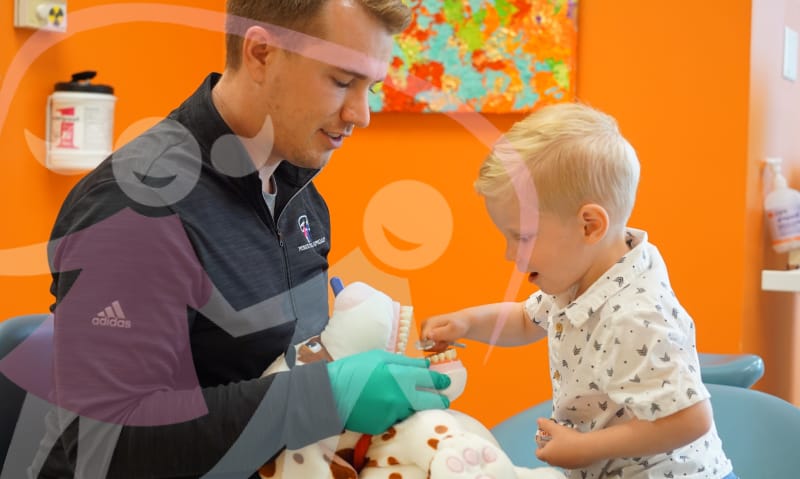5 Baby Teeth Myths You Shouldn’t Fall For

There are so many things for new parents to pay attention to when caring for their babies or toddlers. And it seems that these little ones don’t come with an instruction or care manual. That can leave many parents scratching their heads, wondering what to do to help their children grow into strong, healthy, and responsible members of society. So, let’s focus on one of those things that parents need to understand: baby teeth myths.
Why are there so many misconceptions about baby teeth?
Babies and toddlers go through a lot of phases. For example, a newborn can only digest and consume milk, but then, often sooner than we desire, they are eating baby oatmeal. Not long after that, they start to eat baby food, then crackers, and then the world becomes their oyster.
Within these phases, parents need to take certain steps and precautions to care for their child. And it’s no different when it comes to the care of baby teeth. Though baby teeth tend to stick around longer than the typical early childhood phase, they are just a phase. Knowing how to care for baby teeth and dispelling common baby teeth myths are paramount to helping your child establish and maintain good oral health.
So what are some common baby teeth myths? Read on so that you can understand what to be on the lookout for and how to avoid common misunderstandings when it comes to baby teeth.
Baby teeth myth #1: Baby teeth don’t need to be brushed or flossed.
Like we said before, baby teeth are just a phase. But, that doesn’t mean that those baby teeth don’t require some daily care. You should begin brushing your baby’s gums shortly after they are born by massaging the gums with the tip of a clean finger or a clean, damp washcloth. When your baby’s first tooth comes in, you should brush their tooth (and teeth) daily with a baby-appropriate toothbrush and dentist-approved baby toothpaste. Baby teeth need to be flossed too. Be sure to floss your child’s teeth as soon as they start to fit closely together. This usually happens between the ages of two and six.
Baby teeth myth #2: Only permanent teeth are important.
Your baby’s primary teeth are just as important as their permanent teeth. These early teeth are critical to the development of your child’s speech. Baby teeth are also important for chewing when your baby is old enough to consume solid foods. But perhaps most importantly, your child’s baby teeth create space for those future adult teeth that will come in. Most kids start to get their permanent teeth between ages four and seven.
Baby myth #3 : You don’t need to practice oral care for your child until they start teething.
As we suggested above, you should begin brushing your baby’s gums shortly after they are born by massaging the gums with the tip of a clean finger. You should get in the habit of wiping your baby’s gums with your finger or a damp, soft washcloth or oral gauze every day. Don’t worry about toothpaste at this age, as it isn’t necessary. What’s more critical is ridding your baby’s mouth of bacteria that have developed throughout the day and getting them used to having some cleaning device (at this early stage, a cloth or your finger) in their mouths. The latter will help your child be more comfortable at the dentist when they are older.
Baby myth #4: Your child doesn’t need to go to the dentist until they start school.
As your child prepares to enter primary school, they often need a series of vaccinations and a physical examination conducted by their medical provider. For this reason, parents often think that their child doesn’t need their first dental visit until around that same time. But in reality, your child should have their first trip to the dentist around the time of their first birthday or within six months of the eruption of their first tooth.
At this first visit, your child’s pediatric dentist will get to know you and your child and will start to explore your child’s mouth. Depending on your child’s age, the dentist may examine the teeth, jaws, bite, gums, and oral tissues to ensure proper growth and development.
Baby myth #5: It’s okay if your child experiences a knocked-out tooth.
Because baby teeth eventually fall out and are replaced with adult teeth, a common baby teeth myth is that a knocked-out baby tooth is of no concern. But if your child does fall or experience some other trauma that causes a knocked-out baby tooth, it is important that you seek care from a pediatric dentist as soon as possible. Anyone well-versed in dentistry for children will want to ensure there is no further damage to the gums or bone. And, in some cases, your child’s pediatric dentist may wish to insert a space maintainer to keep the space open for the future permanent tooth.
Avoid baby teeth myths by scheduling your baby’s first dental visit by age one.
There are so many things for new parents to learn when it comes to taking care of their child. And when it comes to their oral health, the best thing parents can do is not fall for those baby teeth myths and schedule their child’s first dental visit shortly after their first tooth erupts. Pediatric Dental Specialists offer four convenient locations in Nebraska and are ideally suited to offer pediatric dentistry for you and your child. And the best way to get started? Request an appointment today. We look forward to seeing you.